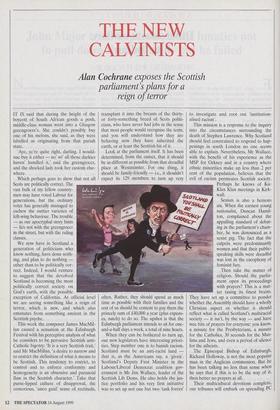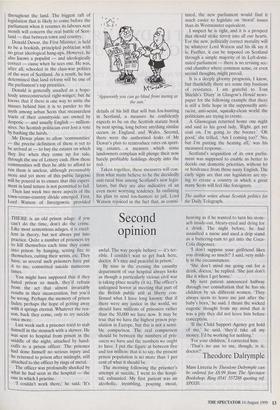THE NEW CALVINISTS
Alan Cochrane exposes the Scottish
parliament's plans for a reign of terror
IT IS said that during the height of the boycott of South African goods a posh, middle-class woman went into a Glasgow greengrocer's. She couldn't possibly buy one of his melons, she said, as they were labelled as originating from that pariah state.
`Aye, ye're quite right, darling. 1 would- nae buy it either — no' wi' all those darkies haven' handled it,' said the greengrocer, and the shocked lady took her custom else- where.
Which perhaps goes to show that not all Scots are politically correct. The vast bulk of my fellow country- men may have voted Labour for generations, but the ordinary voter has generally managed to eschew the nuttier varieties of left-wing behaviour. The trouble — as our apocryphal story hints — lies not with the greengrocer in the street, but with the ruling classes.
This week the composer James MacMil- lan caused a sensation at the Edinburgh Festival with his perceptive analysis of what he considers to be pervasive Scottish anti- Catholic bigotry: 'It is a very Scottish trait,' said Mr MacMillan, 'a desire to narrow and to restrict the definition of what it means to be Scottish. This tendency to restrict, to control and to enforce conformity and homogeneity is an obsessive and paranoid flaw in the Scottish character.' Take that purse-lipped culture of disapproval, the censorious, ‘unco guid' sense of rectitude, transplant it into the breasts of the thirty- or forty-something breed of Scots politi- cians, who have never had jobs in the sense that most people would recognise the term, and you will understand how they are behaving now they have inherited the earth, or at least the Scottish bit of it.
Look at the parliament itself. It has been determined, from the outset, that it should be as different as possible from that dreadful place at Westminster. For one thing, it should be family-friendly — i.e., it shouldn't expect its 129 members to turn up very often. Rather, they should spend as much time as possible with their families and the rest of us should be content to pay them the princely sum of £40,000 a year (plus expens- es, natch) to do so. The upshot is that the Edinburgh parliament intends to sit for one- and-a-half days a week, a total of nine hours.
When they can be bothered .to turn up, our new legislators have interesting priori- ties. Step number one is to banish racism. Scotland must be an anti-racist land that is, as the Americans say, a 'given'. Scotland's Deputy First Minister in the Labour/Liberal Democrat coalition gov- ernment is Mr Jim Wallace, leader of the Scottish Lib Dems. He also holds the jus- tice portfolio and his very first initiative was to set up not one but two 'task forces' to investigate and root out 'institution- alised racism'.
This mission is a response to the inquiry into the circumstances surrounding the death of Stephen Lawrence. Why Scotland should feel constrained to respond to hap- penings in south London no one seems able to explain. Nevertheless, Mr Wallace, with the benefit of his experience as the MSP for Orkney and in a country where ethnic minorities make up less than 2 per cent of the population, believes that the evil of racism permeates Scottish society. Perhaps he knows of Ku- Klux Klan meetings in Kirk- wall.
Sexism is also a heinous sin. When the earnest young nationalist, Duncan Hamil- ton, complained about the appalling standard of debat- ing in the parliament's cham- ber, he was denounced as a sexist pig. The fact that the culprits were predominantly women and that their public- speaking skills were dreadful was lost in the cacophony of feminist fury.
Then take the matter of religion. Should the parlia- ment open its proceedings with prayers? This is a mat- ter taxing its finest brains. They have set up a committee to ponder whether the Assembly should have a wholly Christian aspect or whether it should reflect what is called Scotland's multiracial society — it isn't, by the way — and have wee bits of prayers for everyone: you know, a minute for the Presbyterians, a minute for the Catholics, 30 seconds for the Mus- lims and Jews, and even a period of silence for the atheists.
The Episcopal Bishop of Edinburgh, Richard Holloway, is not the most popular man in the Anglican communion. But he has been talking no less than sense when he says that if this is to be the way of it, then better no prayers at all.
Their multicultural devotions complete, our tribunes will embark on spreading PC throughout the land. The biggest raft of legislation that is likely to come before the parliament when it resumes its labours next month will concern the real battle of Scot- land — that between town and country.
Donald Dewar, the First Minister, is held to be a bookish, principled politician with no great ideological hang-ups. However, he also knows a populist — and ideologically correct — cause when he sees one. He was, after all, schooled in the class-war politics of the west of Scotland. As a result, he has determined that land reform will be one of the parliament's top priorities.
Donald is generally assailed as a hope- lessly unreconstructed right-winger; but he knows that if there is one way to unite the masses behind him it is to pander to the myth among urban Scots that measureless tracts of their countryside are owned by despotic — and usually English — million- aires. No Scottish politician ever lost a vote by bashing the lairds.
Mr Dewar plans to allow 'communities' — the precise definition of these is yet to be arrived at — to buy the estates on which they live when they come up for sale, through the use of Lottery cash. How these communities will then be able to afford to run them is unclear, although presumably more and yet more of this public largesse will he poured in to ensure that this experi- ment in land tenure is not permitted to fail.
Then last week two more aspects of the town-versus-country divide emerged. First, Lord Watson of Invergowrie provided Apparently you can go blind from staring at the sun.'
details of his bill that will ban fox-hunting in Scotland, a measure he confidently expects to he on the Scottish statute book by next spring, long before anything similar occurs in England and Wales. Second, there were the authorised leaks of Mr Dewar's plan to reintroduce rates on sport- ing estates, a measure which some landowners complain will plunge their now barely profitable holdings deeply into the red.
Taken together, these measures will con- firm what many believe to be the decidedly anti-rural bias among Scotland's new legis- lators, but they are also indicative of an even more worrying tendency. In outlining his plan to send fox-hunters to jail, Lord Watson rejoiced in the fact that, as consti- tuted, the new parliament would find it much easier to legislate on 'moral' issues than its Westminster equivalent.
I suspect he is right, and it is a prospect that should strike terror into all our hearts. For the new, politically correct morality will be whatever Lord Watson and his ilk say it is. Further, it can be imposed on Scotland through a simple majority of its Left-domi- nated parliament — there is no revising sec- ond chamber where common sense, or even second thoughts, might prevail.
It is a deeply gloomy prognosis, I know, but thankfully there are some tiny bastions of resistance. I am grateful to Tom Shields's 'Diary' in Glasgow's Herald news- paper for the following example that there is still a little hope in the supposedly anti- racist, anti-sexist, squeaky-clean world the politicians are trying to create.
A Glaswegian returned home one night and said to his good lady, 'Right, get yer coat on. I'm going to the boozer.' Oh good,' she trilled. 'Am I coming too?"No, but I'm putting the heating aff,' was his measured response.
Scotland's acquisition of its own parlia- ment was supposed to enable us better to decide our domestic priorities, without let or hindrance from those nasty English. The early signs are that our legislators are try- ing to create a country in which a great many Scots will fee] like foreigners.
The author writes about Scottish politics for the Daily Telegraph.



























































 Previous page
Previous page